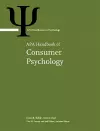
APA Handbook of Consumer Psychology
3 contributors - Hardback
£207.00
Lynn R. Kahle, PhD, has always believed that consuming food contributes to happiness and sustaining health. He received his PhD in social psychology from the University of Nebraska (corn-fed beef) and subsequently worked as a postdoctoral fellow at the University of Michigan Institute for Social Research (Frankenmuth chicken). He is emeritus professor of marketing and recipient of the 2014 Thomas Stewart Distinguished Professorship at the University of Oregon Lundquist College of Business (Dungeness crab, fresh strawberries). For many years he chaired the department of marketing there (Voodoo donuts, pinot wine). He served as founding director of the Warsaw Sports Marketing Center (craft beer, hazelnuts). He has also taught at Hanyang University in Seoul (kimchi), Pace University in New York (pizza), Griffith University in Australia (bbq’d prawns), Copenhagen Business School in Denmark (smørrebrød), and Singapore Management University (chili crab). He has enjoyed a study abroad program in Vienna, Austria (wienerschnitzel) and won a Fulbright scholarship to work in Phnom Penh, Cambodia (samlor korko). He previously served as President of the Society for Consumer Psychology. He represented consumer psychology two terms on the American Psychological Association Council of Representatives and chaired the APA Membership Board. He advocated for human rights as the President of the City of Eugene Human Rights Presidents’ Council. Meetings of these groups often involved a tuna sandwich lunch. He was honored with the Lifetime Achievement Award from the American Marketing Association Consumer Behavior SIG and the Distinguished Career Contributions to the Scientific Understanding of Sports Business from the American Marketing Association Sports SIG. He received the Stotlar Award for Education from the Sport Marketing Association. Champagne is nice on occasion. Dr. Kahle helped develop the List of Values and has subsequently conducted research on values and lifestyles. His work has been published in the Journal of Personality and Social Psychology, Journal of Consumer Psychology, Journal of Consumer Research, and Journal of Marketing. He has also studied consumption in relation to religion, to sport, and to sustainability. His 15 books include Marketplace Lifestyles in an Age of Social Media with Pierre Valette-Florence and Consumer Social Values, edited with Eda Gurel-Atay.
Tina M. Lowrey, PhD, (University of Illinois) is Professor of Marketing at HEC Paris. Her research interests include children’s consumer behavior, materialism, the application of psycholinguistic theory to marketing communications, and gift-giving and ritualistic consumption. Her work has appeared in numerous journals, including Journal of Consumer Research, Journal of Consumer Psychology, Journal of Marketing, Journal of the Association for Consumer Research, International Journal of Research in Marketing, and Journal of Advertising. She is currently serving on the JCR Policy Board, and is on the editorial review boards of the Journal of Consumer Psychology, International Journal of Research in Marketing, and Journal of Advertising. She edited Brick & Mortar Shopping in the 21st Century and Psycholinguistic Phenomena in Marketing Communications (both Erlbaum). She coedited The Routledge Companion to Consumer Behavior (with Mike Solomon). She has chapters in Contemporary Consumption Rituals: A Research Anthology (which she coedited with Cele Otnes); Handbook of Research on Identity Theory in Marketing; The Psychology of Entertainment Media: Blurring the Lines Between Entertainment and Persuasion; The Sage Handbook of Persuasion: Developments in Theory and Practice; Handbook of Media Effects; Go Figure: New Directions in Advertising Rhetoric; Handbook of Qualitative Research Methods in Marketing; Marketing Communication: Emerging Trends and Developments; Gender Issues and Consumer Behavior; Gift Giving: A Research Anthology; and New Developments and Approaches in Consumer Behavior Research, among others. She has served as ACR Treasurer, cochaired the first-ever virtual ACR conference in 2020 (which was supposed to be in Paris), has cochaired three European and Latin American ACR conferences, and solo-chaired an SCP boutique conference and an APA Division 23 conference. She received a BBA in Finance from the University of Houston, an MS in Advertising from the University of Illinois, and her PhD in Communication and Social Psychology from the University of Illinois. She has taught at Rider University (New Jersey), the University of Texas at San Antonio, and is currently at HEC Paris (serving as PhD Coordinator at the latter two institutions). She has visited at ESCP Paris, NYU, Tulane, University of Sydney, and Wharton. She currently teaches two doctoral seminars at HEC: research methods to PhD students in all business disciplines, and consumer behavior to primarily marketing students.
Joel Huber, PhD, is the Alan D. Schwartz Professor Emeritus at the Fuqua School of Business, Duke University. He received his undergraduate degree from Princeton and his MBA and PhD in 1974 from the Wharton School of the University of Pennsylvania. In addition to Fuqua, he has taught at the business schools at Penn, Columbia, and Purdue University. He was associate dean for the Daytime program at Fuqua from 1995–1999. He is on the review boards for numerous journals and has been an associate editor for Journal of Consumer Research, Journal of Consumer Psychology, Marketing Science, and International Journal of Research in Marketing. From 2006–2009 he served as editor-in-chief for the Journal of Marketing Research, and from 2014–2020 was the inaugural editor-in-chief for the Journal of the Association for Consumer Research. His research interest focuses on predicting and understanding market choice, with a continuing focus on ways to measure preference through choice-based conjoint analysis. He has worked for many years with Sawtooth Software and others to help develop new ways to determine the best ways to measure consumers’ product desires and beliefs. A series of grants from the U.S. Environmental Protection Agency led to studies of the value of cleaner lakes and streams and healthier drinking water. That work later evolved into a number of studies with W. Kip Viscusi and Jason Bell exploring household recycling behavior from a large national sample of households between 2005 and 2015. Research with Martin Meissner and others has used eye tracking to reveal the way people process complex repeated choice tasks.